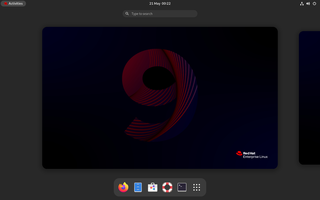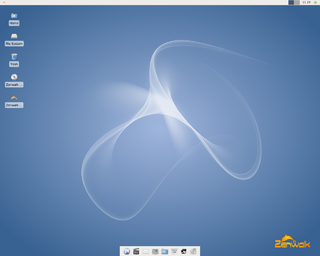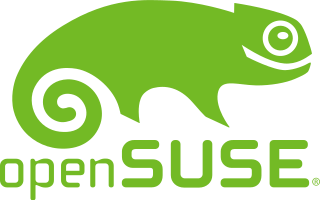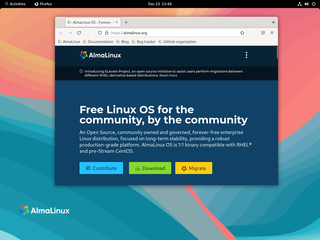
Red Hat Enterprise Linux (RHEL) is a commercial open-source Linux distribution developed by Red Hat for the commercial market. Red Hat Enterprise Linux is released in server versions for x86-64, Power ISA, ARM64, and IBM Z and a desktop version for x86-64. Fedora Linux and CentOS Stream serve as its upstream sources. All of Red Hat's official support and training, together with the Red Hat Certification Program, focuses on the Red Hat Enterprise Linux platform.

Arch Linux is an independently developed, x86-64 general-purpose Linux distribution that strives to provide the latest stable versions of most software by following a rolling-release model. The default installation is a minimal base system, configured by the user to only add what is purposely required.

Ubuntu is a Linux distribution based on Debian and composed mostly of free and open-source software. Ubuntu is officially released in multiple editions: Desktop, Server, and Core for Internet of things devices and robots. The operating system is developed by the British company Canonical, and a community of other developers, under a meritocratic governance model. As of October 2023, the most-recent release is 23.10, and the current long-term support release is 22.04.
Technical variations of Linux distributions include support for different hardware devices and systems or software package configurations. Organizational differences may be motivated by historical reasons. Other criteria include security, including how quickly security upgrades are available; ease of package management; and number of packages available.

Zenwalk GNU/Linux is a desktop-focused Linux distribution founded by Jean-Philippe Guillemin. It is based on Slackware with very few modifications at system level making it 100% compatible with Slackware. It aims to be a modern, multi-purpose Linux distribution by focusing on internet applications, multimedia and programming tools. It comes with many specialized tools and is designed for beginner through advanced users, as it offers system configuration via both graphical tools and the command line.

openSUSE is a free and open-source Linux distribution developed by the openSUSE project. It is offered in two main variations: Tumbleweed, an upstream rolling release distribution, and Leap, a stable release distribution which is sourced from SUSE Linux Enterprise.

SUSE Linux Enterprise (SLE) is a Linux-based operating system developed by SUSE. It is available in two editions, suffixed with Server (SLES) for servers and mainframes, and Desktop (SLED) for workstations and desktop computers.

Linux is a family of open-source Unix-like operating systems based on the Linux kernel, an operating system kernel first released on September 17, 1991, by Linus Torvalds. Linux is typically packaged as a Linux distribution (distro), which includes the kernel and supporting system software and libraries, many of which are provided by the GNU Project. Many Linux distributions use the word "Linux" in their name, but the Free Software Foundation uses and recommends the name "GNU/Linux" to emphasize the use and importance of GNU software in many distributions, causing some controversy.

gNewSense was a Linux distribution, active from 2006 to 2016. It was based on Debian, and developed with sponsorship from the Free Software Foundation. Its goal was user-friendliness, but with all proprietary and non-free software removed. The Free Software Foundation considered gNewSense to be composed entirely of free software.

Linux Mint is a community-driven Linux distribution based on Ubuntu, bundled with a variety of free and open-source applications. It can provide full out-of-the-box multimedia support for those who choose to include proprietary software such as multimedia codecs. Compared to Ubuntu, it uses the Cinnamon interface by default, using a different, more traditional layout that can be customized by dragging the applets and creating panels. New applets can also be downloaded.

Desura was a digital distribution platform for the Microsoft Windows, Linux and OS X platforms. The service distributed games and related media online, with a primary focus on small independent game developers rather than larger companies. Desura contained automated game updates, community features, and developer resources. The client allowed users to create and distribute game mods as well.

Manjaro is a free and open-source Linux distribution based on the Arch Linux operating system that has a focus on user-friendliness and accessibility. It uses a rolling release update model and Pacman as its package manager. It is developed mainly in Austria, France and Germany.

elementary OS is a Linux distribution based on Ubuntu LTS. It promotes itself as a "thoughtful, capable, and ethical" replacement to macOS and Windows and has a pay-what-you-want model. The operating system, the desktop environment, and accompanying applications are developed and maintained by elementary, Inc.
Besides the Linux distributions designed for general-purpose use on desktops and servers, distributions may be specialized for different purposes including computer architecture support, embedded systems, stability, security, localization to a specific region or language, targeting of specific user groups, support for real-time applications, or commitment to a given desktop environment. Furthermore, some distributions deliberately include only free software. As of 2015, over four hundred Linux distributions are actively developed, with about a dozen distributions being most popular for general-purpose use.

OpenMandriva Lx is a general-purpose Linux distribution maintained by the OpenMandriva Association for x86 (32/64-bit) and ARM computers. It is a community-supported continuation of Mandriva Linux, which was active from 1998 until 2011. OpenMandriva is offered in a stable release edition, and a rolling release edition named Rome. It uses the RPM Package Manager and uses KDE Plasma as its default desktop environment.

Zorin OS is a Linux distribution based on Ubuntu. It uses a GNOME 3 and XFCE 4 desktop environment by default, although the desktop is heavily customized in order to help users transition from Windows and macOS easily. Wine and PlayOnLinux are supported, allowing users to run compatible Windows software, like Microsoft Office. Its creators maintain three free editions of the operating system, and sell a professional edition.

Windows Subsystem for Linux (WSL) is a feature of Windows that allows developers to run a Linux environment without the need for a separate virtual machine or dual booting. There are two versions of WSL: WSL 1 and WSL 2. WSL 1 was first released on August 2, 2016, and acts as a compatibility layer for running Linux binary executables by implementing Linux system calls on the Windows kernel. It is available on Windows 10, Windows 10 LTSB/LTSC, Windows 11, Windows Server 2016, Windows Server 2019 and Windows Server 2022.

Pop!_OS is a free and open-source Linux distribution, based on Ubuntu, and featuring a customized GNOME desktop environment known as COSMIC. The distribution is developed by American Linux computer manufacturer System76. Pop!_OS is primarily built to be bundled with the computers built by System76, but can also be downloaded and installed on most computers.

AlmaLinux is a free and open source Linux distribution, developed by the AlmaLinux OS Foundation, a 501(c) organization, to provide a community-supported, production-grade enterprise operating system that is binary-compatible with Red Hat Enterprise Linux (RHEL). The name of the distribution comes from the word "alma", meaning "soul" in Spanish and other Latin languages. It was chosen to be a homage to the Linux community.

















